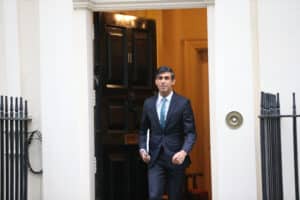Rishi Sunak has warned households suffering from Britain’s worsening cost of living crisis to brace themselves for further increases in energy costs later this year, as critics said his £9bn emergency package was insufficient to prevent millions more struggling with fuel poverty.
Prompted into action by the prospect of the average household paying an extra £700 a year for gas and electricity, the chancellor said he accepted it was a “very difficult time” but that a combination of temporary, repayable discounts and council tax rebates would help soften the blow.
Sunak said that as things stood, the price cap of £1,971 set by the energy regulator Ofgem would rise further in the autumn, prompting calls for the government to do more to help those on the poorest incomes.
The Resolution Foundation thinktank said even with the government support, the number of people living in fuel stress – in households where more than 10% of the budget is spent on energy – would double to 5 million.
“These energy crisis measures are woefully inadequate and will leave those on the lowest incomes and in the least efficient homes in deep peril,” said Adam Scorer, the chief executive of charity National Energy Action. “We needed deep, targeted support for the most vulnerable. We have shallow, broad measures for all. That simply does not work.”
Under the Treasury plan, 28 million electricity customers will have £200 knocked off their bills in October, with the money repaid in £40 annual instalments over the next five years. Council tax payers in England in bands A to D will receive a rebate of £150 from their bills in April, which will not have to be paid back, while separate sums have been set aside for Scotland, Wales and Northern Ireland to use as the devolved governments see fit.
Local authorities will receive £150m to make discretionary payments to 300,000 poorer families who live in homes in a council tax band above D, while the number of households eligible for the warm homes discount – worth £150 from October – is to be increased by a third to 3m.
The chancellor’s package came as the Bank of England accompanied an increase in interest rates to 0.5% with a warning that living standards in the next two years would take their biggest hit in at least three decades. Threadneedle Street said it expected the annual inflation rate – already 5.4% – to peak at more than 7% this spring, with prices rising far faster than wages.
Andrew Bailey, the Bank’s governor, said he was concerned by the impact higher borrowing costs would have on poorer households already hit by rising fuel bills. Households face an unprecedented two-year hit to their living standards after a fall in real average incomes this year of 2% and a fall in 2023 of 1.5%.
However, Bailey argued that the cost of living crisis would worsen if inflation was allowed to spiral out of control.
“We have not raised interest rates today because the economy is roaring away,” he said. “An increase in Bank Rate is necessary because it is unlikely that inflation will return to target without it.”
Speaking at a press conference, Sunak said there was nothing the government could do to affect the rising global price of energy but he hoped his measures would ease anxiety over the cost of living.
He said: “£350 is a significant amount of money that will make a big difference to the vast majorities of households and I hope actually people will be reassured by us stepping in to provide that support.”
Rachel Reeves, the shadow chancellor, said Labour’s plan to cut VAT on energy bills and make the warm homes discount for poorer households more generous would have covered most of the £700 increase for struggling households.
On the day Shell reported a quadrupling of annual profits to $19bn (£14bn) after cashing in on rocketing oil and gas prices, she criticised the chancellor for failing to impose a windfall tax on corporations.
“The chancellor wants to load costs on taxpayers with a buy now, pay later scheme – while Labour will keep bills low with a windfall tax on North Sea oil and gas producers with booming profits,” Reeves said.
“In the midst of a cost of living crisis, the government’s proposals will leave families in Britain paying hundreds of pounds more as a result of the breathtaking rise in energy prices. It will be of little comfort to many.”
Analysis by the Joseph Rowntree Foundation – a charity that focuses on measures to alleviate poverty – showed that, even accounting for Sunak’s support package, families on low incomes would be spending an average of 16% of their incomes after housing costs on energy bills, compared with 5% for middle-income families. Single-adult households on low incomes would spend a “shocking” 43% on average of their income after housing costs on energy bills, it found.
Joanna Elson, the chief executive of the Money Advice Trust, the charity that runs National Debtline, said: “The government’s support measures will help a little – but energy rises will hurt a lot. Low-income households need the government to go further – with support that matches the full scale of the problem. This should include uprating benefits and, thinking ahead, increasing the support available through the warm momes discount.”
Paul Johnson, the director of the Institute for Fiscal Studies thinktank, said: “Overall, of course, this package will not stop average incomes and living standards from falling over the coming year. An average earner on £30,000 a year will still be around £400 worse off next fiscal year than this. An out-of-work lone parent is likely to be over £300 worse off.”
“The withdrawal of the £200 support for energy costs in 12 months’ time, accompanied by a £40-a-year repayment, will at best dampen any recovery in living standards going forward.”
The IFS said the council tax rebate was only loosely targeted at the neediest people. Almost half of those living in homes in council tax banks A to D were in the top half of the income distribution, some of them in the top income bracket.
Read more:
Rishi Sunak tells Britons to brace for even higher energy costs in autumn
















